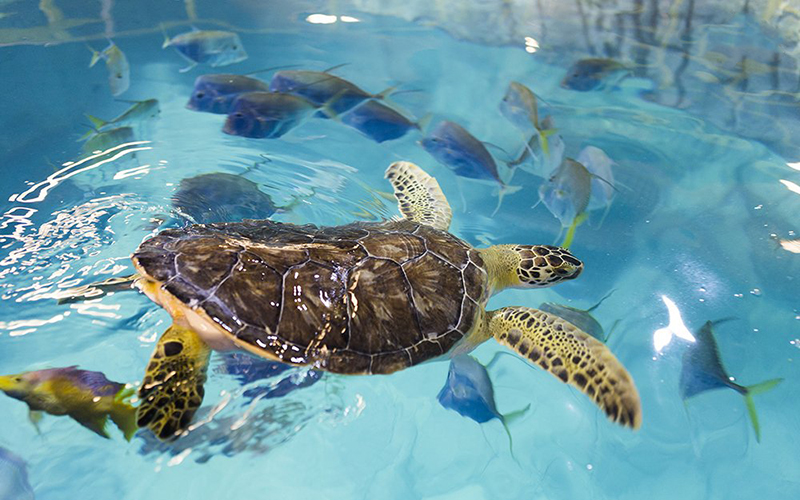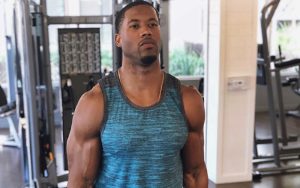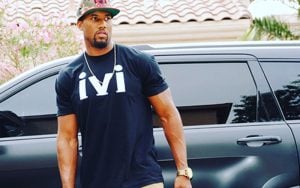
Valor is one of the many turtles rehabilitated at the Rescue Conservation Program at OdySea Aquarium in Scottsdale. Turtles like this one was what inspired Glenn Love to create a clothing line. (Photo courtesy of OdySea Aquarium)
LOS ANGELES — Like many accomplished football players, Glenn Love Jr. never worried much about life after the game. When he started playing professionally, however, the uncertainty set in.
That changed after a visit to the Turtle Rescue conservation program at the OdySea Aquarium in Scottsdale.
“They were like missing some limbs and I was like, ‘What happened? Why are they missing limbs’? ” said Love, a former Chandler Hamilton High School standout who plays linebacker for the Montreal Alouettes of the Canadian Football League.
Love learned the turtles had been injured by plastic debris, including plastic water bottles in the ocean. The aquarium had to remove their limbs in order to save the turtles from dying.
Around that same time, in May of 2017, Love launched IInner Vision Apparel company, a sustainable clothing line. He wanted a business that could also make a social impact. Inspired in part by the turtles, the apparel is made from 95 percent recycled material, and shirts specifically are constructed from five to 10 plastic bottles, recycled cotton and eco-friendly water-based ink.
Plastic that is not recycled often ends up in a landfill or ocean. According to a study by the New Hampshire Department of Environmental Services, plastic takes about 450 years to decompose into the earth. If it lands in the ocean, it can potentially add to an island of trash debris in the Pacific that has grown up to 600,000 square miles, according to a study in the Nature the International Journal of Science, which is twice the size of the Texas.

Glenn Love Jr. plays linebacker in the Canadian Football League. He was a standout at Hamilton High. (Photo courtesy Glenn Love Jr.)
In addition to the harmful effects of plastic, the fashion industry has a significant impact on the environment, experts say. Whether it is the practices used overseas to grow cotton or the transportation used, the apparel industry leaves a substantial carbon footprint. That motivated Love to focus on recycled cotton.
“The carbon footprint is seen in transportation and where it’s grown and how it’s grown. Most fibers are being grown with pesticides,” said Nicole Darnall, a professor of management and public policy at Arizona State’s Julie Ann Wrigley Global Institute of Sustainability. “They are chemically grown. And most synthetics fibers are derived from petroleum.”
Before Love had a passion for sustainable fashion, he was a football standout at Hamilton High. He lettered in four sports at the varsity level and holds the school record for most interceptions in a season (10). He also secured a 5A MVP title and a state championship.
After graduating from Hamilton, he played four seasons at UCLA where he was converted from defensive back to linebacker. He is playing his seventh season in the Canadian Football League.
Once Love started his professional career, he said he felt it was his duty to show that athletes can make a positive impact on society.
“I wanted to make sure that it wasn’t just me that (my future) was affecting but it was affecting other people, too, in a positive way,” Love said.
A visit to an aquarium gave him direction.
“Seeing those things swim sideways because it had one arm, that’s because of us not because of them. They didn’t do anything wrong,” Love said. “It is because of us. Millions of sea creatures and sea life dies because of us. That really changed things.”
Love was looking for a manufacturer to produce his clothing line around the same time he visited the aquarium and found Brett Matheson, the owner of Yoganastix, a company in Arizona that produces clothing material from recycled plastic bottles.

Glenn Love. Jr. works out in clothing made from IInner Vision Apparel, the sustainable clothing company he owns. (Phot courtesy Glenn Love Jr.)
“He (Matheson) really showed me some materials … polyester, cotton, the blends and all that kind of stuff. Last one he showed me was like recycled bottles so I am like, ‘what’? ” Love said.
In that moment Love knew what he was going to do.
“When you see those turtles and me seeing this material, it was meant to be,” he said.
Although it is a good start to becoming more sustainable, it does have unintended consequences, said George Basile, a senior sustainability scientist at the Julie Ann Wrigley Global Institute of Sustainability. Microfiber pollution, which is the shedding of microplastics from synthetic fabrics used to make clothing, can occur.
“It’s not a bad step. You’re building a business on the idea of cycling, and cycles and surfaces and recycling. … That may position you better for using other materials that need to be recycled that are OK that leak into nature,” Basile said. “I think overall it’s a good step toward where you want to go but it’s incomplete. We want business that are interested in heading toward completeness but also are not trapped by having to be perfect.”
More than a year has passed since Love launched IInner Vision Apparel. The company has expanded from being online only to being included in Kalloni’s Closet Boutique in Gilbert.
“Immediately, he reminds me so much of myself just from his personality. Just like out how he operates,” owner Keller Ziegler said. “This is absolutely going to work out.”
The lack of a business background and fashion acumen created a few setbacks for Love, who has struggled to adjust to unexpected obstacles.

Glenn Love Jr. wears items from his clothing line. Recycled plastic bottles are used to make his shirts. (Photo courtesy Glenn Love Jr.)
“Now I’ve got to learn how to deal with people overseas, that when I was going to bed they were getting up,” he said. “So I was getting up at 3 in the morning. You cannot speak the same language and you might say one thing to someone from here and they might interpret it as something else.”
This has not deterred Love, who hopes to one day have his own brick and mortar storefront for IInner Vision, as well as be a distributor for other apparel companies looking to use sustainable materials for their clothing. He is looking to develop a business relationship with fitness brand SoulCycle and to expand into Canada.
“Maybe have a store where its all eco-friendly brands. Might be local. Might be from Zimbabwe,” Love said. “It doesn’t matter.”
“I want to have eco-friendly clothes so everyone can see that we can compete with the rest of the world with making good quality clothes.”
This story is part of Elemental: Covering Sustainability, a new multimedia collaboration between Cronkite News, Arizona PBS, KJZZ, KPCC, Rocky Mountain PBS and PBS SoCal.